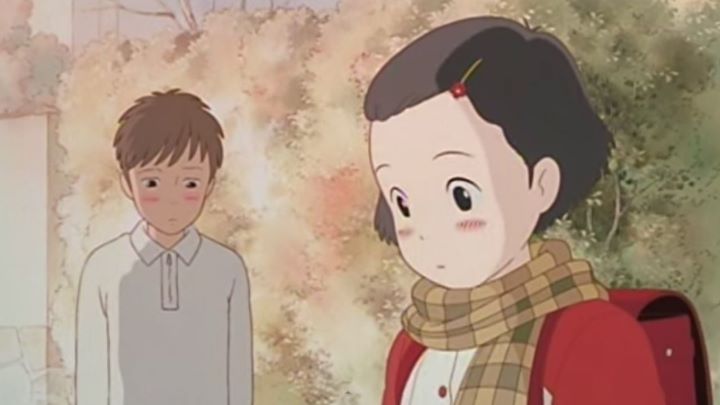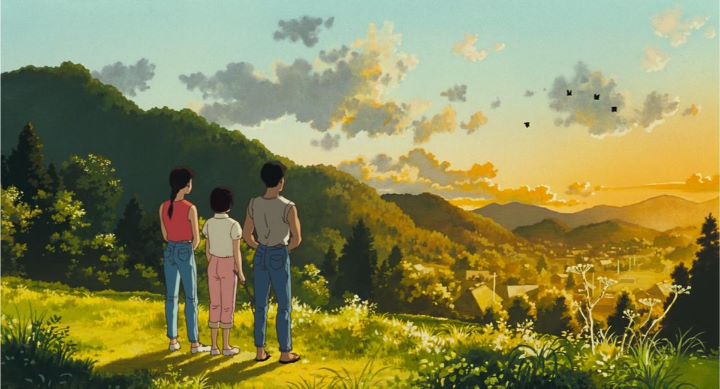








While Studio Ghibli wasn't known around the world at first, by the time they secured a distribution deal with Disney in North America (including theatrical and home video releases, and quality English dubs), they and all of their films became highly respected. But believe it or not, there were two Ghibli films that long hadn't received any release in English. These two films in question were "Only Yesterday" and "Ocean Waves." Each would be released decades later by GKIDS, but the question remains why it took so long. "Only Yesterday" in particular is considered a full theatrical release, directed by Isao Takahata, one of Ghibli's trademark visionaries. What was wrong with it?Since Disney long had the exclusive rights to Ghibli's catelogue, they had the right to refuse any films they deemed inappropriate to their branding. "Only Yesterday" does have a brief but significant scene involving young girls learning about puberty and certain changes that only occur to women. Most likely, this alone was enough to discourage Disney from acknowledging its existance. From a broader perspective, the story doesn't really have any fantastical elements to go on, being very much grounded in reality, and therefore easier to appreciate by adults than by children. Which is to say, "Only Yesterday" is a difficult film to market, and on paper seems incredibely dull. This in itself resulted in the movie to have a divided fanbase: most still haven't even heard of the movie, but those who have are quick to claim it as one of their personal favorites, if only because they had the privillage to watch the last Ghibli film to come in English. The story starts with Taeko Okajima, a single 27-year-old woman living in modern Japan, about to take time off from work to visit distant relatives in the countryside and help them harvest their crops. This already makes Taeko a unique character: who would use their vacation time to work on a farm? But she finds the change of environment and honest labor a breath of fresh air, and makes a point to do this each year. As she returns to the farm, she begins to recall vivid memories of her childhood, providing a vehicle for most of the film to act as a series of vignettes made up of these memories. These scenes range from friends playing, bullies, crushes, school, summertime, wintertime, and everything else that kids typically go through. Some are nostalgic, some are regretful, some still leave her confused to this day about where she has ended up with her life. Being single, her time on the farm and recollection of these memories slowly bring Taeko towards accepting that her place is to stay on the farm permanently with a potential romantic interest.In their own way, the scenes are unusually poigniant in the truest sense. The scenes depicting everyday childhood moments don't hold anything back to make them seem nicer in terms of content, and that makes them immediately easy to relate to. Some of these examples simply don't get included in stories in any medium. It makes Taeko one of the most believale female protagonists of any film, and her sense of nostalgia and longing is in itself an extra layer that adults can understand, again in a way rarely depicted. Keep in mind, there is probably a reason this type of story isn't depicted in film often. That's where I have to give Takahata extra credit as the director and writer for this film, as he manages to keep the story lighthearted with an appropriate sense of humor, and gives the story direction towards its end. The production values seem a bit weaker than most of Ghibli's movies. The character design in particular is a bit unusual, especially with the faces; for some reason, Takahata tried to make their expressions more real by adding smile-lines from the edges of their mouths to their noses whenver they grin or laugh. It makes adult characters seem decades older, then younger again when they return to normal. Inspired, but also very distracting, there should have been more consistency to the characters in these different phases. Some scenes also appear deceptively simple, especially with some of the rose-colored scenes of Taeko's youth. The animation still fares well, with impressive detail to some character animation that helps the movie hold up even today. The music is also a bit unusual to what Ghibli's films tend to have, which gives it some extra personality, albiet not a particularly memorable one. The English dub, prepared in 2016, is good, but the authentic Japanese voices help bring the film to the level comparable to live-action foreign drama.I certainly respect "Only Yesterday" and am happy to have seen it. But weaker production values and a more grounded story make it feel different from what Ghibli is known for, and frankly, I would rather watch Ghibli's other works. Perhaps when I am older still, I might return to this movie with a renewed sense of nostalgia, and have a different opinion.
The production values seem a bit weaker than most of Ghibli's movies. The character design in particular is a bit unusual, especially with the faces; for some reason, Takahata tried to make their expressions more real by adding smile-lines from the edges of their mouths to their noses whenver they grin or laugh. It makes adult characters seem decades older, then younger again when they return to normal. Inspired, but also very distracting, there should have been more consistency to the characters in these different phases. Some scenes also appear deceptively simple, especially with some of the rose-colored scenes of Taeko's youth. The animation still fares well, with impressive detail to some character animation that helps the movie hold up even today. The music is also a bit unusual to what Ghibli's films tend to have, which gives it some extra personality, albiet not a particularly memorable one. The English dub, prepared in 2016, is good, but the authentic Japanese voices help bring the film to the level comparable to live-action foreign drama.I certainly respect "Only Yesterday" and am happy to have seen it. But weaker production values and a more grounded story make it feel different from what Ghibli is known for, and frankly, I would rather watch Ghibli's other works. Perhaps when I am older still, I might return to this movie with a renewed sense of nostalgia, and have a different opinion.